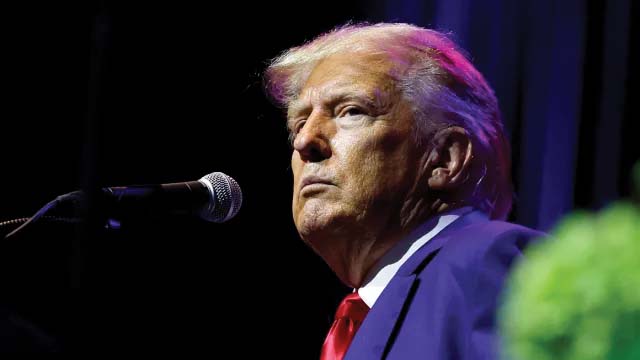Shared from/by Niall Stanage
The Hill
Former President Trump’s legal woes are overshadowing everything else in the political world — but they are causing much more serious political problems for his GOP rivals than for his own candidacy.
It’s become next to impossible for the Republicans chasing Trump to get traction, or even attention for their ideas, while the maelstrom swirls around him.
Trump was indicted in a third case last week, relating to his attempts to overturn the 2020 election. He has previously been indicted in New York in April regarding the alleged falsification of business records, and in June in Florida relating to the sensitive documents uncovered at Mar-a-Lago.
An investigation in Georgia into efforts by Trump and his allies to overturn the election result in that state could produce more charges any day now.
In aggregate, those events would be politically fatal to any other candidate. To be sure, they could wound Trump badly in a general election if he becomes the GOP nominee.
An ABC News/Ipsos poll released Friday indicated that 52 percent of Americans believe Trump should indeed have been charged in the latest indictment, compared to 32 percent who thought he should not have been charged.
But Trump is leading the GOP field by almost 40 points in national polling averages and, if his previous two indictments are any guide, he will likely get a fundraising boost in response to his most recent legal troubles.
Meanwhile, his rivals trail far in his wake.
“Look, they are on an impossible road,” said former Rep. Joe Walsh (R-Ill.), who ran a long-shot campaign against Trump for the GOP nomination in 2020.
Walsh argued that Trump’s rivals can’t win by frontally opposing him, because of his popularity with the Republican base, “but if they embrace him, they can’t then really differentiate themselves from him.”
That conundrum is made all the more difficult when Trump commands the news headlines, even for negative reasons.
Walsh drew a comparison with the initial publicity his own bid received in its early days of the 2020 cycle before news broke of the Ukraine-related events that led to Trump’s first impeachment.
“That became the biggest story in the country for three months,” he noted.
Far from trying to move past his legal troubles, Trump has instead sparked further controversies that could be designed, at least in part, to keep controversy blazing — and perhaps to prolong the period before any trial.
On Sunday, he demanded the recusal of U.S. District Judge Tanya Chutkan, who has been randomly assigned to his case, contending that “there is no way I can get a fair trial” under her.
Previously, special counsel Jack Smith had cited a Trump social media post — “If you go after me, I’m coming after you!,” it said — in a Friday court filing seeking a protective order to curb public disclosure of information provided under the discovery process in the case.
There are some signs that Trump’s rivals are recalibrating their approach in response to the most recent developments.
Former Vice President Mike Pence has been direct in outlining his differences with Trump over the then-president’s efforts to pressure him to overturn the 2020 election result.
“President Trump was wrong then and he’s wrong now,” Pence said on CNN’s “State of the Union” on Sunday. “I had no right to overturn the election.”
Florida Gov. Ron DeSantis, Trump’s closest, if distant, GOP rival told NBC News in an interview broadcast Monday “of course he lost,” in reference to Trump’s fate in the 2020 election. “Joe Biden’s the president.”
DeSantis’s comment is plainly true, but polling has consistently shown around 70 percent of Republican voters refuse to accept the legitimacy of President Biden’s victory.
“The new Ron DeSantis view — ‘Of course Trump lost’ — is a new, big change in the DeSantis approach,” said Jamil Jaffer, who served as associate counsel to former President George W. Bush. “That should not be undercounted, because this is the first time his principal rival is saying that he lost and there is no question about it.”
Others argue that, for all of Trump’s strengths with the Republican base, questions about his capacity to win a general election will ultimately undercut his candidacy. His nomination is far from a foregone conclusion, they contend.
Barry Bennett, who was a senior adviser to Trump’s 2016 campaign but is supporting Miami Mayor Francis Suarez (R) in this campaign, contended that questions over “winnability” were Trump’s Achilles’ heel.
“Trump’s path is like the Titanic; you don’t turn 90 degrees just like that,” Bennett claimed. “It takes a while. There is not going to be this one day where there will be a poll and people will have abandoned Trump. That’s just not the way it works. They have to get comfortable with their next choice. I think it is a much slower, more deliberative process.”
But even Bennett acknowledged that Trump’s long shadow over the news agenda was a problem for this GOP rivals.
“It certainly makes it more difficult, because every time you do a TV hit or a media interview, the only questions are what you think about Trump,” he said.
Independent experts agree — and argue that no competitor to Trump has yet found a way to thread the needle.



